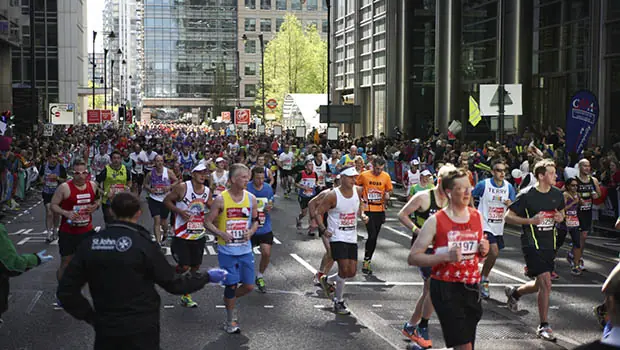
Most everyone has heard the notion of "carbo-loading" the night before a race, but just how effective is eating a big plate of spaghetti to "carb up" for 26.2 miles? And is it for everyone? If not, what kinds of foods should we reach for?
To answer these questions and more, we sat down with Medifast dietician Alexandra Miller, R.D.N., L.D.N. — also a runner herself — to get the facts on how your body uses food as fuel to get through a long day of running.
Carbo-Loading: Helpful or Hype?
Miller says loading up on carbohydrates before a race can have benefits, but you must do it correctly. Because carbs are our primary source of energy, eating the right amount of the macronutrient can make or break your performance in a race.
When you take in carbohydrates before a race — or any type of activity, for that matter — you are creating a source of glycogen, which your body uses for energy.
Unfortunately, more is not always better in this case. Your body can only handle a certain amount of glucose before you experience gastrointestinal distress — and ain't nobody got time for that during a race.
Overdoing it on carbohydrates can lead to bloating, constipation, diarrhea and general sluggishness, which can make or break your race-day success.
More: Q&A with Tim Reed: How to Pack Your Pockets and Fuel Up For Long Runs
Marathon Training ... for your Tummy
Luckily, you can train your GI and digestive system just like you train your body for a marathon. During your mileage training, allow your stomach to get used to carbo-loading by trying a few different types and portions of carbohydrate-rich foods and see which one(s) work best for your body.
Miller points out that everyone is different as far as what his or her body can handle, so there is not a solid rule on exactly what and how much to eat before a run.
If you're new to long-distance nutrition, a good guideline to follow is having three to five grams of carbs per pound of body weight for the entire day. This means that a 140-pound woman should consume 420 to 700 carbohydrate grams the day before a marathon. As previously noted, be sure to adjust these amounts depending on how your body reacts to the carbs you take in.
Pre-Race Meal Suggestions
So is making a beeline to Olive Garden your only option for a pre-race meal? Not necessarily. While carbohydrates should play a big part in your pre-race nutrition plan, Miller also suggests the following foods as day-before-race options:
- Starchy vegetables, such as sweet potatoes, summer squash and pumpkin
- Whole grains (breads, bagels, pasta, brown rice, quinoa)
- Healthy fats, such as avocado, nuts, olives and salmon
- Proteins, such as skinless chicken breast and lean cuts of beef
She also notes that foods with antioxidants—such as whole grains, fish, nuts and potatoes—help counteract the free radicals created during exercise. Take in foods with both carbs and antioxidants, and you're double dipping into the marathon food gold mine.
If you're uncomfortable eating a big dinner or used to having your last meal in the late evening, you should consider having your carb-heavy meal for lunch. Either way, make sure to consume the recommended three to five grams of carbohydrates per pound of body weight over the course of the day.



